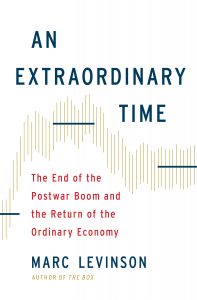
The 1970s may have been the most miserable decade in recent memory, at least until COVID-19 came along. It was a decade of gasoline lines, jobless queues, rampant inflation, and international instability. An Extraordinary Time takes a fresh look at this period from an economic perspective, and develops a new understanding of why, in the late 1970s and early 1980s, countries around the world embraced free-market ideas that had been in disrepute for half a century.
The years after World War Two, beginning around 1948 and lasting until 1973, were, as the title suggests, an extraordinary time, a time of remarkable improvement in living standards in every wealthy economy. Unemployment was very low. Inflation was under control. New homes sprouted by the tens of millions, and rapidly expanding universities opened their doors to the children of average working families. A growing welfare state provided income security, offering old-age pensions, disability benefits, unemployment insurance. Year after year, people could feel their lives getting better. Economists promised that economic volatility was a thing of the past. Thanks to computers and fancy quantitative tools, they claimed, governments now had the ability to provide jobs for all and keep recession at bay.
And then, at the end of 1973, the dream fell apart. Boom turned to bust almost overnight, and worries about shortage of workers and raw materials vanished amid a global recession. Unemployment rates soared. So did inflation. Japan, the United States, Canada, and Western Europe all faced unexpected economic crises. The spike in oil prices in October 1973 was widely blamed for these problems, but there was a much deeper cause. Improvements in productivity — the efficiency with which economies make use of labor, capital, and technology — all but stopped. This was a problem governments could do little about, leaving voters around the world angry with politicians who could no longer fulfill their promises of full employment and steady economic growth.
With big government unable to deliver the goods, the public mood turned against it in one country after another. Politicians who promised to cut government down to size — Margaret Thatcher, Ronald Reagan, Helmut Kohl, and others — stepped into the void. But their ideas, centering on tax cuts and deregulation, proved no more successful in restoring rapid growth and full employment than the less market-oriented politicians they supplanted. The reason, I argue, is that the postwar miracle was made possible by circumstances that will never recur. The world economy did not collapse; it returned to normal — a situation in which incomes grow slowly and living standards improve at a gradual place. Public expectations are far greater than what political leaders can deliver.
An Extraordinary Time is, in the words of historian Erich Rauchway, “a provocative account of recent economic history.” The journalist Peter Coy predicted in Bloomberg BusinessWeek, “An Extraordinary Time won’t sit well with people who believe that removing various obstacles to growth would bring back the way we were.” Writing in the Times Literary Supplement, British economist Paul Collier termed the book “a valuable antidote to all passionately held economic ideologies,” while University of Haifa historian Eli Cook described it in Enterprise & Society as “an incredibly valuable, lively, and comprehensive economic history.” In The Wall Street Journal, Yale University historian Paul Kennedy praised it as “a smoothly written account.” As the political analyst Michael Barone wrote in the Claremont Review, “The Golden Age was extraordinary not because it lasted just one generation, but because it managed to last that long. The framework its architects designed was well adapted to the nation and world in the aftermath of World War II. In retrospect, it was hubristic to believe that it would be as well suited to the nation and world that came to exist 28 years later.”